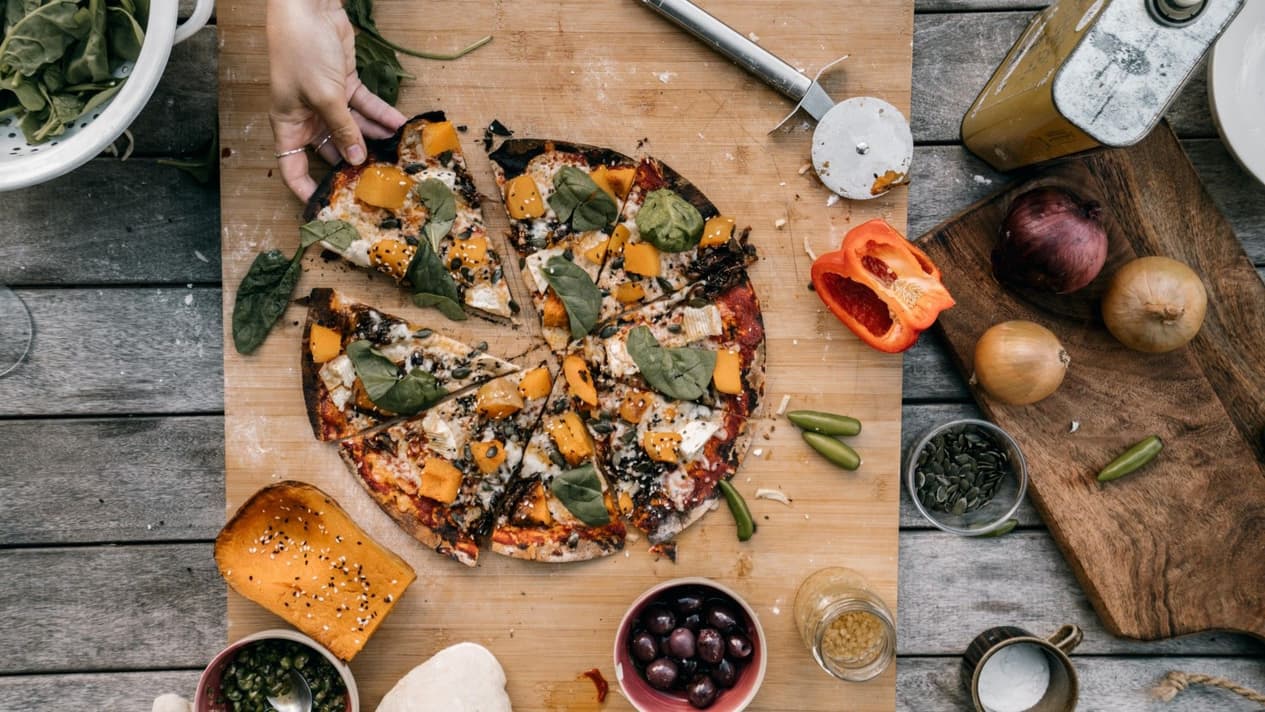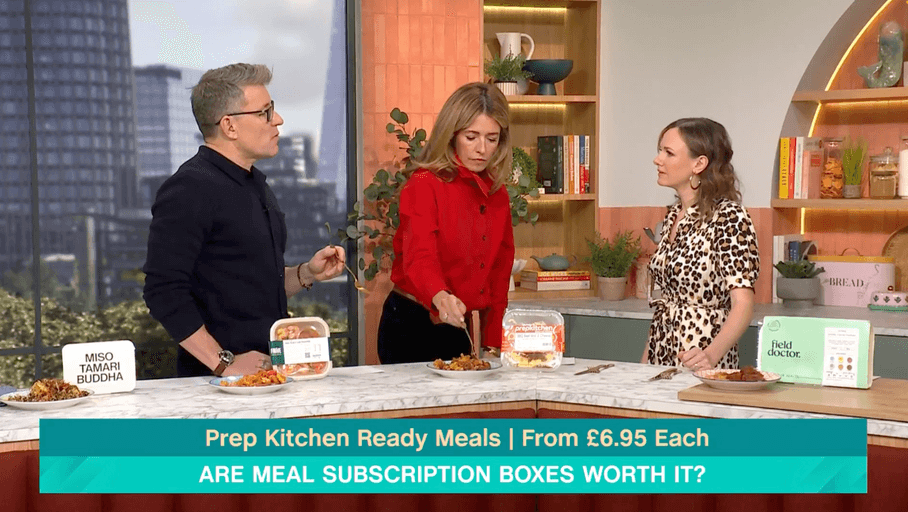Dining out can be a lot of fun - it's a great way to catch up with friends without the hassle of cooking and clearing up. However, the dark side of dining out is that when we do, we tend to overeat and make bad food choices ( 1, 2, 3, 4, 5). If you only eat out once in a blue moon, then it's fine to let loose with your menu choices, but if you're regularly dining out for work, when travelling, or trying to navigate the Christmas party season, it can be a challenge if you have health and fitness goals.
The good news is that there are various hacks you can use to help keep your diet on track, and without spoiling your fun!
Read my 10 top tips on how to enjoy eating out without overindulging:
1. Have a healthy high-protein snack before you go out
It isn't uncommon to skip meals before dining out so that you can enjoy every bite at dinner. However, arriving at a restaurant hungry is the last thing you want to do when you're trying to eat healthily - you'll find that this is a recipe for over-indulgence ( 6).
You can avoid this by trying to ensure that your meals on the day are high in protein, and enjoying a healthy, high-fibre or high-protein snack before you get to the restaurant. This will help you feel fuller and prevent over-eating ( 7). Read our blog for more information about how protein can help you manage your weight
2. Check out the menu ahead of time
If possible, check out the restaurant menu beforehand. It's easy to get caught up in the excitement of dining out; tempted by the smells wafting in from the kitchen, the sights of other people's meals, even the colours of the restaurant and the fancy wine glasses can have us wanting to eat and spend lavishly! It's enough to tempt you into ordering more than you intend, especially when you're hungry ( 8).
If you can, decide what you're going to eat ahead of time, away from the temptation, distraction and excitement of the restaurant environment. Write down your meals in your Notes app, or on paper, and stick to these choices this when the server comes around. Doing so also gives you an idea of the nutritional value of your meals beforehand, and helps give you control over your eating.
3. Stay hydrated! Drink water with your meals.
Sometimes when we think we're hungry we're just thirsty. So try drinking a glass of water next time you think you're hungry and see if that makes a difference. When the stomach senses that it's full, it sends signals to the brain to stop eating. Water can help to take up space in the stomach, leading to a feeling of fullness and reducing hunger ( 9). So drinking water with your meals will help you feel fuller, faster.
Drinking water an hour before a meal has been reported to also help with appetite suppression ( 10)
4. Watch your drinks!
If you're busy focusing on what you're eating, it can be easy to forget what you're drinking! When you dine out, you're more likely to accompany your meal with an alcoholic drink. Unfortunately, there are a number of downsides to doing this. Firstly, drinking alcohol can add a large number of calories to your meal. Secondly, alcohol loosens our resolve and makes us more likely to make poor dietary choices, and to over-eat.
You don't need to cut out alcohol completely, but you can opt for lighter options such as a vodka with soda water, or a dry white wine. Opt for singles rather than doubles, and smaller glasses of wine. Mixing spirits with a diet drink instead of a sugar-sweetened drink or soda can also make a difference: a standard Long Island iced tea cocktail comes in at a whopping 260 calories, compared to a single measure of vodka and soda with a twist of lime which is around 100 calories ( 11)
Even if you avoid alcohol, it's no secret that most carbonated soft drinks are laden with sugar and calories. It's best to stick to water to sip at the table when dining out.
5. Avoid the deep fat fryer
Deep frying foods adds lots of calories. Go for tasty options from the grill instead, as these tend to be juicer and more full of flavour. This means chips too, of course - ask to sub yours with boiled or jacket potatoes, salad, or some steamed veggies, which are lower in calories and high in filling fibre. Read more about the benefits of eating fibre.
6. Eat mindfully
Mindful eating is about being in the moment with what you are eating. It can be as simple as saying to yourself: "I am eating a fillet steak. It is medium-rare and very tender. I am chewing on this steak and it's juicy and full of flavour!" Mindfulness with eating is about paying attention to your food, on purpose, and focusing on your sensual awareness, thoughts and feelings and your experience with your food ( 12, 13).
Eating attentively and mindfully can help you make healthier choices when dining out and also improve your self-control and prevent you from overeating ( 14)
7. Eat slowly
Eating slowly is part of eating mindfully as we can appreciate and savour the tastes, textures and flavours of our meals. But eating slowly also has its physical benefits for good digestion and satiety.
Our appetite is largely controlled by a hormone called ghrelin. After a meal, our gut suppresses ghrelin, which controls hunger, while also releasing fullness hormones ( 15). These hormones tell your brain that you've eaten, reducing the appetite, making you feel full, and helping you stop eating. This process takes about 20 minutes, so the reason we recommend eating slowly is so that we give our brain the time it needs to receive these 'feel full' signals (16, 17).
8. Chew your food!
It goes without saying that we chew our food, but the more chews we can get in per mouthful, the better! Increasing the number of chews before swallowing can help you eat less and feel fuller, quicker ( 18).So as much as you enjoy the food you're devouring, there's no need to rush! Slow down, chew your food thoroughly and enjoy each bite! Chewing your food more will help digestion, and help you eat less.
9. Ask for sauces and dressings on the side
Sauces and dressings can turn a healthy meal into a high-calorie meal. When ordering your meals, make sure to ask for all the sauces and dressings on the side so that you can avoid significant calories from your meal. Having them on the side also gives you control of your food choices- you can decide to add them or not.
10. Ask for healthy alternatives
The waiting staff are there to help, so use them and don't be afraid to ask questions.
Ask them for healthy alternatives and swaps. Ask them how the meals are cooked. Ask if some of your meals can be made with less oil. Ask if there is an off-menu selection of classic meals (for example, a grilled chicken with steamed veggies). Ask for healthy substitutions- most restaurants are happy to comply.
To sum up:
We all love a meal out! The combined experience of socialising with close friends and family, the life and buzz of a restaurant, the pampered table service, dressing up, sharing a bottle of wine, trying new menus at new places, and visiting favourite spots. This can easily make us drop our guards, and indulge more than we should.
But don't dread Saturday night dining, embrace it with newfound confidence. Take control of eating out by applying these tips the next time you dine out.
Remember, the dinners are not in charge of you, you are in charge of the dinners! Embrace the new opportunities we have and have fun in the process.
If you enjoyed this article, read some of these other related articles on our blog:




